Mississippi Blues Trail Markers of DeSoto County
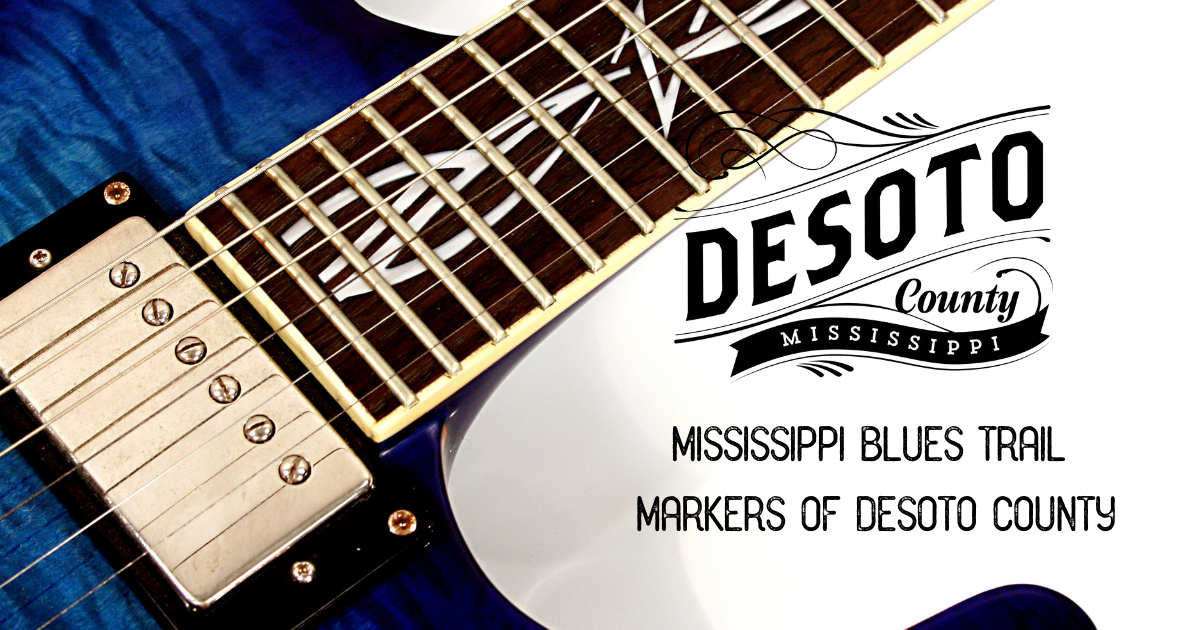
22 Jan / 2024
Did you know DeSoto County, Mississippi, is one of the birthplaces of the blues? To honor the talented musicians who spent significant time in the magnolia state, the Mississippi Blues Commission created the Mississippi Blues Trail in 2006. The trail is a sprawling collection of markers dedicated to the artists who contributed greatly to the genre. It stretches across the state, with each marker giving a synopsis of the musicians’ contributions to the blues. Let’s take a look at the markers found around DeSoto County!
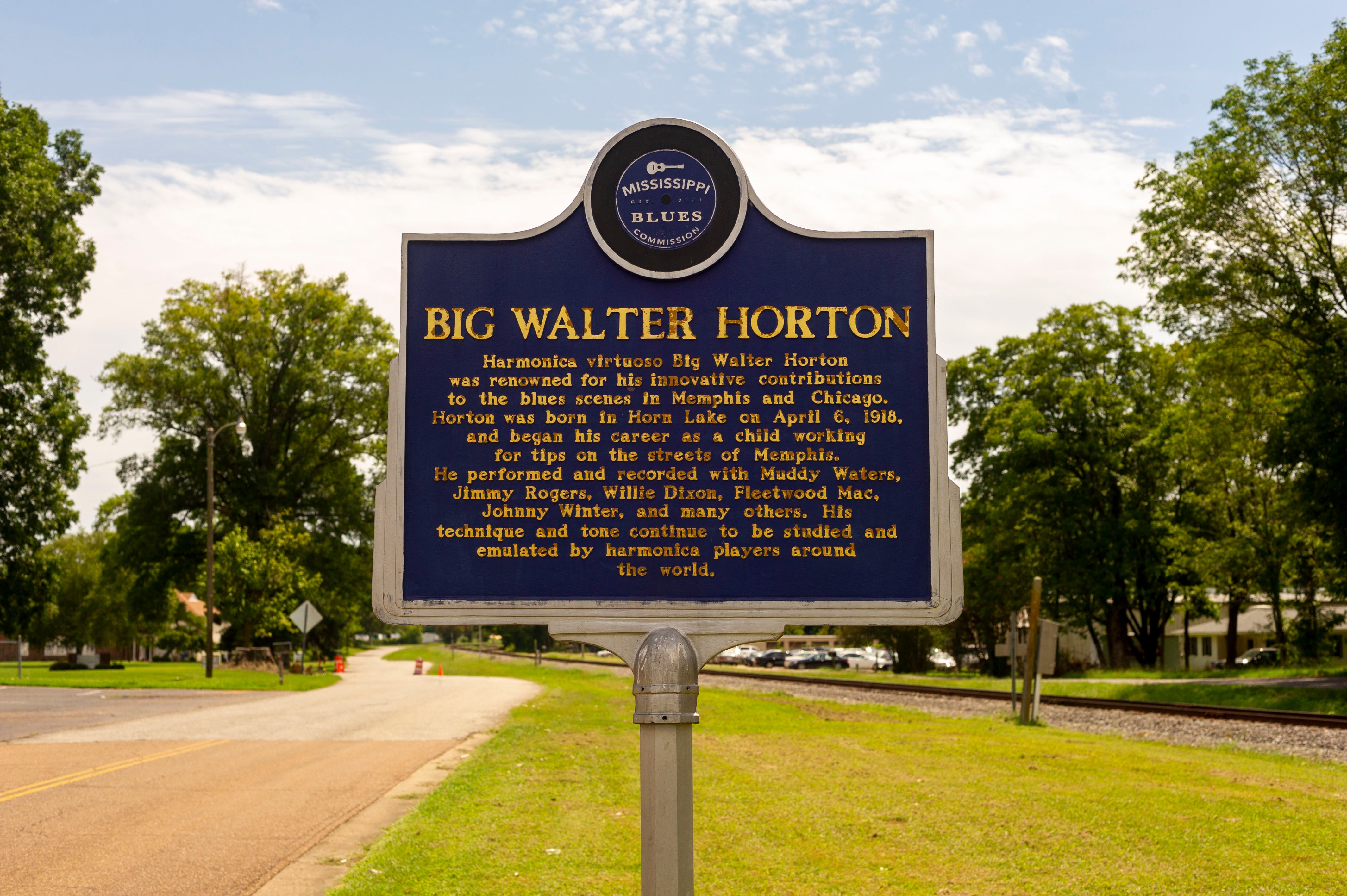 Big Walter Horton was born in 1918 in Horn Lake, and his marker is located on Center Street East in his hometown. He started his musical journey by playing tin cans, later becoming a harmonica virtuoso who made amazing contributions to the blues during his lifetime. In 1951, he began recording for famous Memphis music producer Sam Phillips and then went on to join Chicago’s Muddy Waters Blues Band. Horton was inducted into the Blues Hall of Fame in 1982.
Big Walter Horton was born in 1918 in Horn Lake, and his marker is located on Center Street East in his hometown. He started his musical journey by playing tin cans, later becoming a harmonica virtuoso who made amazing contributions to the blues during his lifetime. In 1951, he began recording for famous Memphis music producer Sam Phillips and then went on to join Chicago’s Muddy Waters Blues Band. Horton was inducted into the Blues Hall of Fame in 1982.
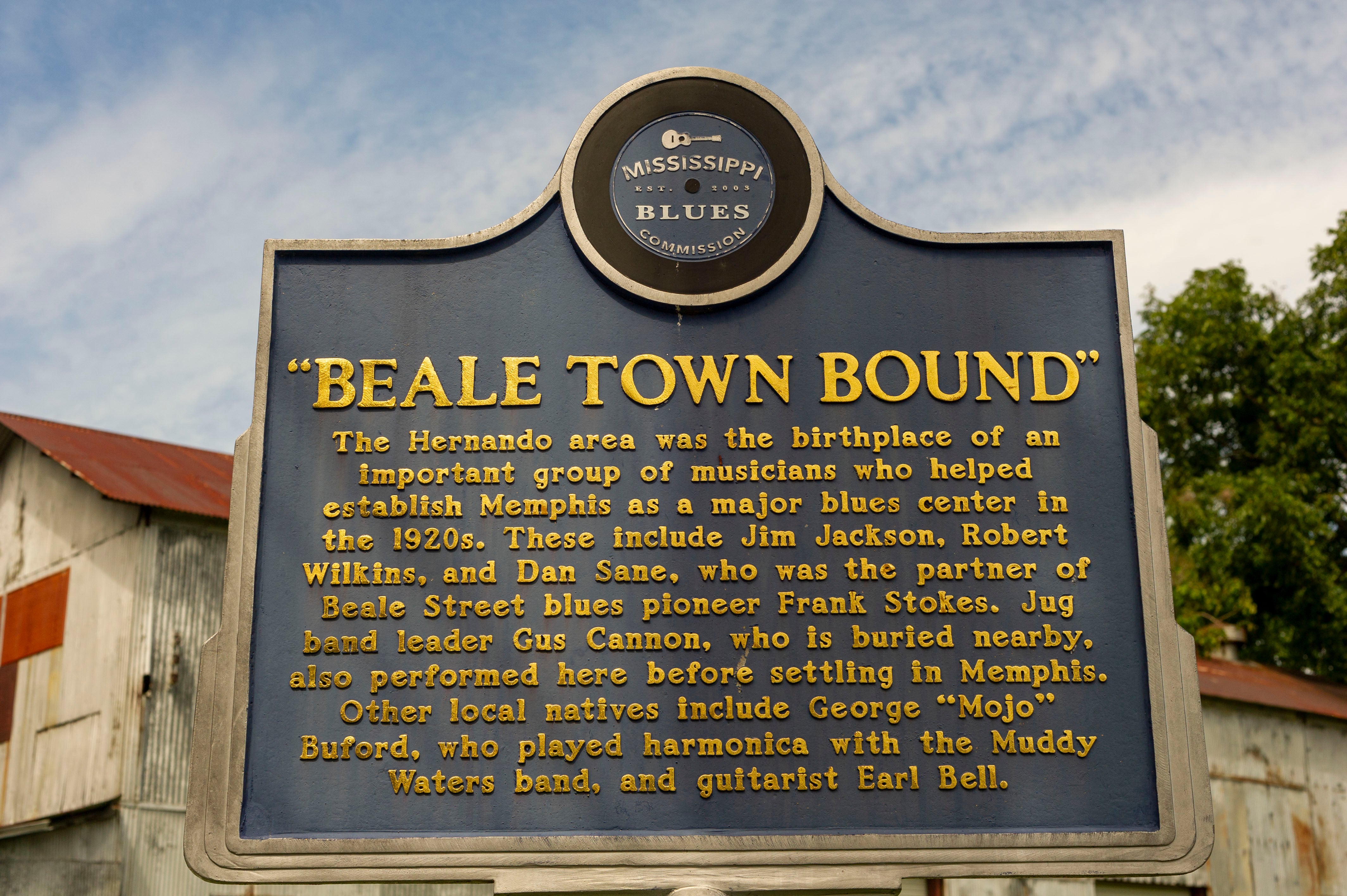 Blues greats like Jim Jackson, Gus Cannon and Robert “Tim” Wilkins are recognized on the Beale Town Bound marker found on West Park Street in Hernando. Each of these musicians took their talents to Memphis’ world famous Beale Street during their careers, hence the name of the marker. Jim Jackson is one of the earliest-born musicians mentioned on the trail with a birth year of 1878. “Jim Jackson’s Kansas City Blues” is a well-known song, which has since been covered by many other musicians. While Gus Cannon wasn’t born here, his final resting place is found in Hernando. The banjo player’s Jug Stompers group recorded the famous “Banjo Joe” in the late 1920s, and he often performed with Jim Jackson. On the west end of Hernando, Robert “Tim” Wilkins frequently performed with Jackson and Cannon at Mary Cotton’s Place. Later, he became a minister whose music was heavily influenced by his faith.
Blues greats like Jim Jackson, Gus Cannon and Robert “Tim” Wilkins are recognized on the Beale Town Bound marker found on West Park Street in Hernando. Each of these musicians took their talents to Memphis’ world famous Beale Street during their careers, hence the name of the marker. Jim Jackson is one of the earliest-born musicians mentioned on the trail with a birth year of 1878. “Jim Jackson’s Kansas City Blues” is a well-known song, which has since been covered by many other musicians. While Gus Cannon wasn’t born here, his final resting place is found in Hernando. The banjo player’s Jug Stompers group recorded the famous “Banjo Joe” in the late 1920s, and he often performed with Jim Jackson. On the west end of Hernando, Robert “Tim” Wilkins frequently performed with Jackson and Cannon at Mary Cotton’s Place. Later, he became a minister whose music was heavily influenced by his faith.
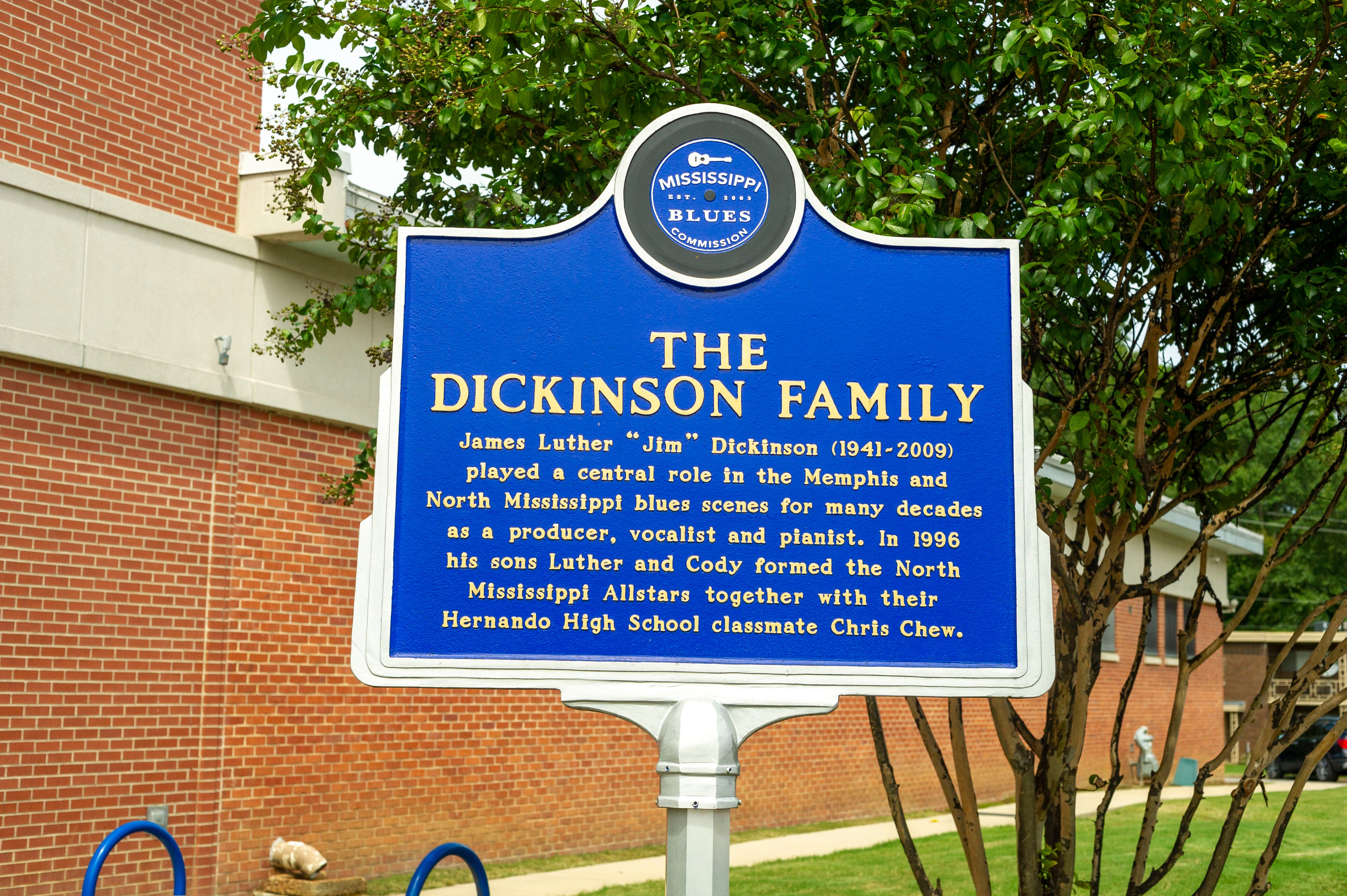 James Luther Dickinson, also known as Jim, was a trusted source on all things music. He spent most of his life helping grow the blues scene in Memphis as a pianist, vocalist and producer, and also as the founder of the Memphis Country Blues Festival that started in the 1960s. As a member of the Dixie Flyers, he performed with top acts such as Aretha Franklin, James Carr and Albert Collins. He also served as a producer for legends like the Rolling Stones, Big Star and Bob Dylan. In the 1980s, he moved to Hernando where he continued his craft in his home studio. Dickinson later supported his sons in forming their American blues and Southern rock band, the North Mississippi Allstars, and was inducted into the Memphis Music Hall of Fame in 2012. The Dickinson Family marker is located on West Commerce Street in Hernando.
James Luther Dickinson, also known as Jim, was a trusted source on all things music. He spent most of his life helping grow the blues scene in Memphis as a pianist, vocalist and producer, and also as the founder of the Memphis Country Blues Festival that started in the 1960s. As a member of the Dixie Flyers, he performed with top acts such as Aretha Franklin, James Carr and Albert Collins. He also served as a producer for legends like the Rolling Stones, Big Star and Bob Dylan. In the 1980s, he moved to Hernando where he continued his craft in his home studio. Dickinson later supported his sons in forming their American blues and Southern rock band, the North Mississippi Allstars, and was inducted into the Memphis Music Hall of Fame in 2012. The Dickinson Family marker is located on West Commerce Street in Hernando.
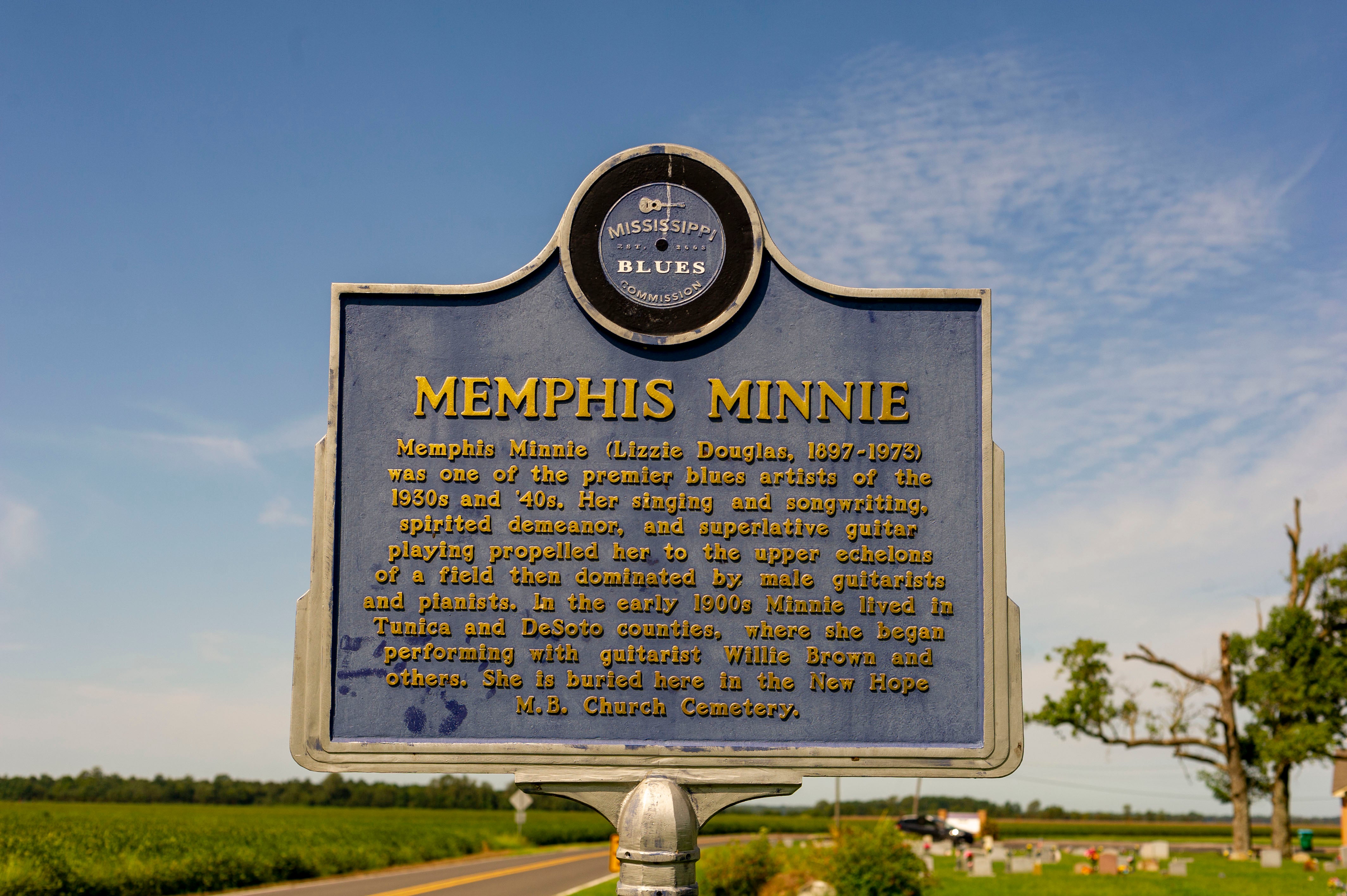 Lizzie “Kid” Douglas is featured on a marker in Walls. Her parents called her Kid throughout her childhood, and it was her stage name before she became known as Memphis Minnie. As a teenager, Minnie decided to move out of her parents’ home to pursue a music career. It is reported that she joined the Ringling Brothers Circus as a traveling musician. She gained notoriety as a lyricist, guitar player and singer in the 1930s and 1940s, and married fellow musician Joe McCoy. The duo became known as Memphis Minnie and Kansas Joe who recorded popular songs like “When the Levee Breaks.” John Fogerty and Bonnie Raitt raised the money for Douglas’ headstone, and she is laid to rest in Walls. In 1980, Memphis Minnie was inducted into the Blues Hall of Fame.
Lizzie “Kid” Douglas is featured on a marker in Walls. Her parents called her Kid throughout her childhood, and it was her stage name before she became known as Memphis Minnie. As a teenager, Minnie decided to move out of her parents’ home to pursue a music career. It is reported that she joined the Ringling Brothers Circus as a traveling musician. She gained notoriety as a lyricist, guitar player and singer in the 1930s and 1940s, and married fellow musician Joe McCoy. The duo became known as Memphis Minnie and Kansas Joe who recorded popular songs like “When the Levee Breaks.” John Fogerty and Bonnie Raitt raised the money for Douglas’ headstone, and she is laid to rest in Walls. In 1980, Memphis Minnie was inducted into the Blues Hall of Fame.
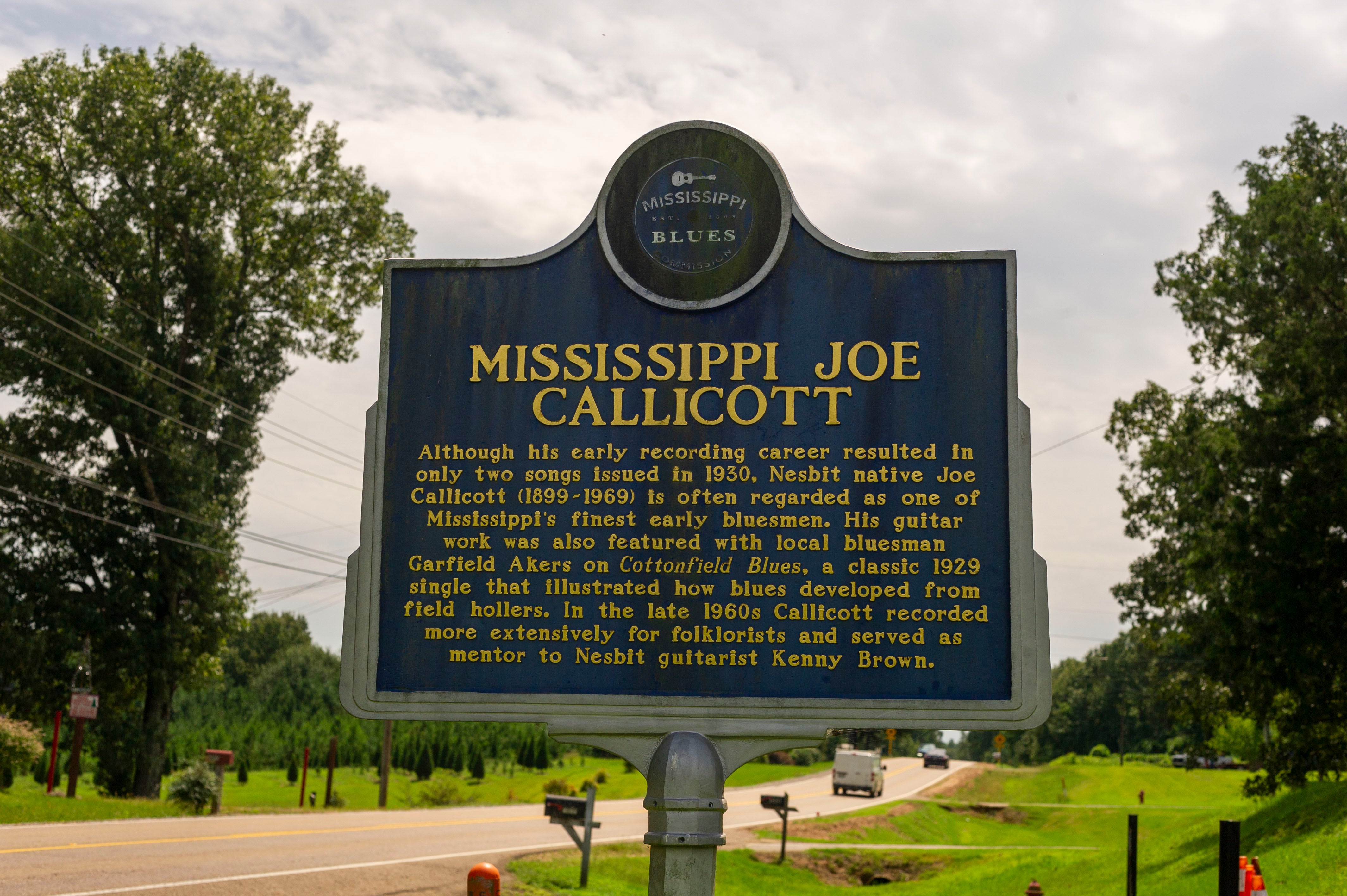 In the Spring Hill community of Nesbit is a marker dedicated to Mississippi Joe Callicott, a blues musician who began to gain in popularity in the 1920s and 1930s. “Cottonfield Blues,” a song he recorded with long-time friend and fellow performer Garfiled Akers, is a fan favorite and has been covered many times by other artists. In the 1940s, Callicott gave up performing, only to return in the late 1960s. His first performance after the hiatus was at the Memphis Country Blues Festival. Mississippi Joe Callicott sang songs about everything from World War I to Beale Street. Callicott was a mentor to Nesbit guitarist Kenny Brown who later became popular in the blues scene.
In the Spring Hill community of Nesbit is a marker dedicated to Mississippi Joe Callicott, a blues musician who began to gain in popularity in the 1920s and 1930s. “Cottonfield Blues,” a song he recorded with long-time friend and fellow performer Garfiled Akers, is a fan favorite and has been covered many times by other artists. In the 1940s, Callicott gave up performing, only to return in the late 1960s. His first performance after the hiatus was at the Memphis Country Blues Festival. Mississippi Joe Callicott sang songs about everything from World War I to Beale Street. Callicott was a mentor to Nesbit guitarist Kenny Brown who later became popular in the blues scene.
Visit these markers along the Mississippi Blues Trail and become immersed in the rich history. And, you can attend one of the many blues events slated for later this year in Downtown Memphis. The Blues Hall of Fame Induction Ceremony is set for Wednesday, May 4 at the Halloran Center, and the 43rd Blues Music Awards will be held on Thursday, May 5 at the Renasant Convention Center. Finally, Beale Street will be rockin’ with blues music courtesy of artists hailing from all over the world May 6-9 during the International Blues Challenge. Remember, DeSoto County is just minutes from Memphis!